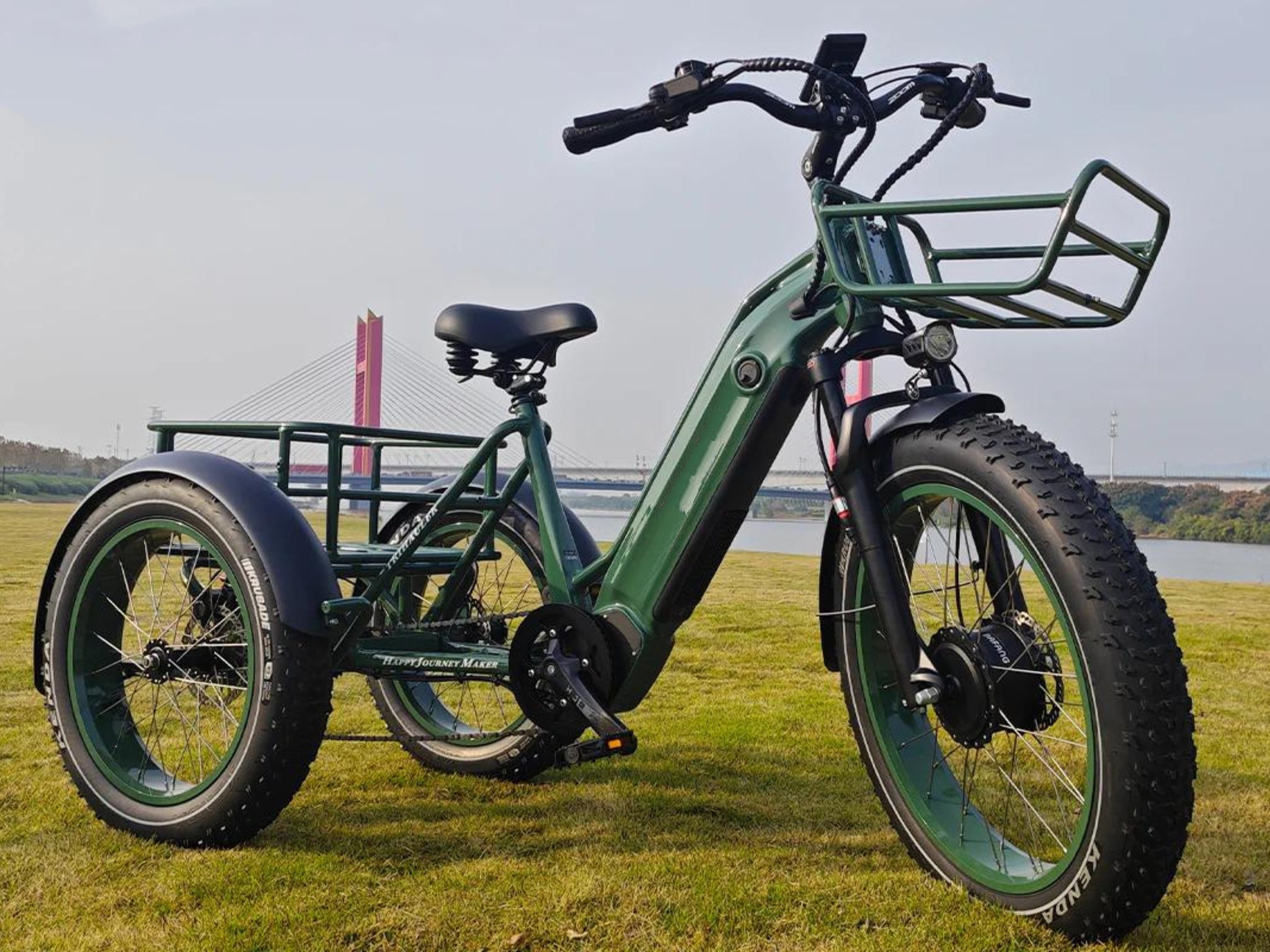
An electric tricycle (e-trike) is a three-wheeled electric vehicle designed for stability, cargo capacity, and ease of use, making it ideal for seniors, delivery services, and urban mobility. Below is a detailed breakdown of key aspects:
1. Types of Electric Tricycles
A. By Design
- Delta Trike (2 wheels in back, 1 in front) – Common for cargo & passenger use.
- Tadpole Trike (2 wheels in front, 1 in back) – More stable at high speeds (less common).
B. By Use Case
- Passenger/Cargo Trikes – Large rear basket or seating (e.g., delivery trikes).
- Senior/Disabled Mobility Trikes – Low step-through, ergonomic seating.
- Commercial/Industrial Trikes – Heavy-duty, high payload (up to 300+ kg).
- Leisure/Recreational Trikes – Comfort-focused, often with canopy options.
2. Key Components & Specifications
| Component | Details |
|---|---|
| Motor | 250W–1500W (hub or mid-drive); 36V/48V/60V systems. |
| Battery | Lead-acid (cheaper) or Lithium-ion (lighter, longer lifespan). |
| Range | 30–100 km per charge (depends on battery capacity: 12Ah–32Ah). |
| Max Speed | 25–45 km/h (varies by region; EU limits to 25 km/h for street legality). |
| Load Capacity | 150–500+ kg (cargo models have reinforced frames). |
| Brakes | Drum, disc, or regenerative braking. |
| Suspension | Some have front/rear suspension for comfort. |
3. Top Applications
✅ Last-Mile Delivery – Food, packages, postal services.
✅ Senior/Disabled Mobility – Safer than two-wheelers.
✅ Urban Commuting – Stable in traffic, can carry groceries/kids.
✅ Tourism & Rentals – Popular in resorts/beach areas.
4. Advantages Over E-Bikes & Scooters
✔ Stability – No balancing needed, safer for elderly/disabled.
✔ Higher Payload – Can carry heavy cargo or multiple passengers.
✔ Parking Convenience – Often smaller than cars.
✔ Low Maintenance – Fewer moving parts than gas vehicles.
5. Buying Considerations
- Budget: 800–5,000+ (cargo/specialized models cost more).
- Local Laws: Some regions require licenses for >250W motors.
- Battery Life: Lithium-ion lasts longer but costs more upfront.
- After-Sales Support: Check warranty (motor/battery coverage).
6. Potential Drawbacks
⚠ Heavier & Bulkier – Harder to store in small spaces.
⚠ Slower Acceleration – Due to weight & 3-wheel design.
⚠ Turning Radius – Wider than bikes/scooters.
Zhejiang Chinebike Electric Technology Co., Ltd. as a manufacturer and supplier of electric bicycles, including mountain eBikes, Dutch-style e-bikes, and electric skateboards.
If you’re considering sourcing from them, here’s what you should know:
1. About Zhejiang Chinebike Electric Technology Co., Ltd
- Location: Zhejiang, China (a major hub for e-bike manufacturing).
- Products: Likely offers OEM/ODM services for electric bikes, including:
- Mountain eBikes (hardtail/full-suspension)
- Dutch-style e-bikes (city/commuter models)
- Electric skateboards
- Competitive Advantages:
- Low-cost manufacturing (typical of Chinese suppliers).
- Customization options (frame design, battery capacity, branding).
- Wholesale/Bulk orders (MOQ may apply).
2. Key Considerations When Ordering
✔ Quality Control – Verify certifications (CE, UL, EN15194 for EU, FDA for U.S.).
✔ Motor & Battery Specs – Check if they use branded (Bafang, Bosch) or generic systems.
✔ Sample Testing – Always request a sample before bulk orders.
✔ Shipping & Logistics – Factor in lead time, import taxes, and warranty support.
✔ After-Sales Service – Confirm if they provide spare parts and technical support.
3. Potential Risks of Sourcing from China
⚠ Hidden Costs (import duties, shipping delays).
⚠ Quality Variance (some suppliers cut corners on components).
⚠ IP Protection (ensure your custom designs are contractually protected).
4. Next Steps
- Contact Chinebike for a quote, specs, and sample availability.
- Compare with other suppliers for better pricing/quality balance.
- Hire a sourcing agent (if unfamiliar with Chinese suppliers) to inspect factories.